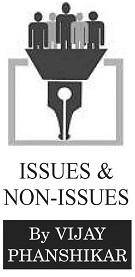We The People -- III
| Date :18-May-2019 |
If such a voicing and assertion of popular will starts taking place beyond the electoral process, then only our democratic experiment will succeed in true terms defying the electoral politics. It is time ‘we the people’ realised this. It is time ‘we the people’ started making our own presence felt to the people in positions of authority, whether in politics or in administration.
WE, THE PEOPLE OF INDIA, having solemnly resolved to constitute India into a SOVEREIGN SOCIALIST SECULAR DEMOCRATIC REPUBLIC ....
- Opening sentence of
the Preamble to
the Constitution of India
THE discourse revolving around the phrase “We The People” has multiple dimensions. The very thought that ‘the people’ have agreed to constitute India as a nation gives them a very special status to be the real sovereigns that govern the nation and control its destiny. In other words, this status makes ‘the people’ the only stake-holders in the process of democratic decision-making in the country.

But there lies the actual hitch. For, no matter the theory, no matter the constitutional proclamations, no matter the political tall talk, we the people of India have yet not become the actual stake-holding participants in the decision-making process. We do have the access to the universal adult franchise. We do take part in the physical exercise of one-person-one-vote in which persons from the President and the Prime Minister to the pattedar (peon) in the Gram Panchayat’s office are treated as on one level in the democratic elections. Despite all this, the reality is that the process of actual participation in decision-making by we the only and sovereign stake-holders has remained only on paper and not stepped into the practical arena.
That is the reason why hundreds of governmental projects are introduced and implemented without any actual gain to the people. That is the reason why hundreds of urban projects mess up the basic concept of prosperous communities in cities, and botch up the inherent idea of close-knit rural communities that inhabit villages in a harmonious manner.
In both, stake-holders are often missing!
This concept of stake-holders’ participation in decision-making is at the core of the constitutional promise India’s leadership offered when they rose in unison to assert that from that moment on, ‘The People’ of India would be the only stake-holders who would operate the democratic system drawn up by themselves and for themselves as it would be a system of their own. Unfortunately, very little of this promise has been fulfilled. For, in most developmental projects, the people’s participation has often stood at the lowest level, or has been almost non-existent, a picture that is available all over the country through a plethora of schemes that are operated statedly for the people but that do not actually benefit the people.
By any standard, this is not how democracy should work!
As is evident from countless governmental projects in cities and villages across the country, the people’s opinion has not found a voice while making the decision. In recent years, the Government is known to have decided upon many multi-billion-rupee projects which it describes as a “game changers”, but in which actual benefit to the people is far away. In countless cases, the projects are actually not needed at all, but are pushed by commercial vested interests whose pockets are eager to be filled through the massive investment that the projects entail.
And such projects are found in both, the urban and the rural areas across the country. Currently, in many cities, one may find countless such projects under the stated name of “Smart City” concept. The initiators of the projects describe those as
“futuristic” and make the people look dumb. A political leader said in clear terms, in effect, that the people do not understand what their cities should look like in future and therefore the leaders must provide them with the models that will stand the test of future. And in that name, a lot of mess is handed down to people.
The biggest trouble with such projects is that they negate what has been considered of lasting value as part of the transfer of legacy of welfare from generation to generation. In that quest of so-called futuristic projects, lakes that have helped the cities and villages for centuries get destroyed, forests that have offered the people a wonderful green cover that keeps the environment clean and healthy get degenerated into ever-shrinking woods, and agriculture that has been the mainstay of rural India gets mauled to such an extent as to make every villager flee for life to some urban area where no good life welcomes him.
All this militates against the concept of Welfare State, and defeats the idea of stake-holders’ participation in developmental process. By no standard can this be called a trajectory.
But this cannot go on and on. this must change, and ‘we the people’ must be the agents of change. It is time the people started taking a keener interest in the developmental process than just casting their votes. They must become proactive in voicing their concerns not through politically-driven organisations but through their own connect with the people in positions of authority. That alone would ensure an adequate and appropriate participation of stake-holders in decision-making for collective good. “We the people’ must assert our right to question the leaders who impose their brazen will on the people in the name of people’s welfare.
If such a voicing and assertion of popular will starts taking place beyond the electoral process, then only our democratic experiment will succeed in true terms defying the electoral politics. It is time ‘we the people’ realised this. It is time ‘we the people’ started making our own presence felt to the people in positions of authority, whether in politics or in administration. True good governance will be ushered in our country only on the shoulders of ‘we the people’, and not just our elected representatives.